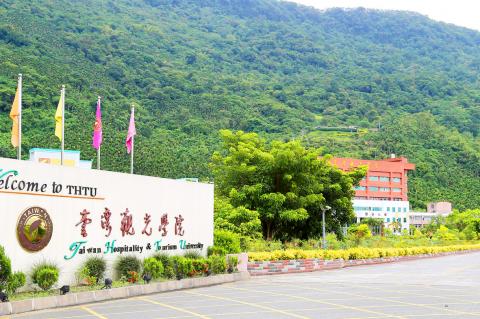A total of 198 university and college departments failed to recruit any students in the 2017 to 2018 academic year, up from 151 last year, a report published by the Ministry of Education said yesterday.
The report found that 198 majors of the 8,849 offered in vocational, bachelors, masters and doctorate programs did not attract any students for the academic year.
The trend is not limited to average or lower-ranking universities.

Photo: CNA
A few doctorate programs at some of the nation’s top schools, including National Taiwan University, National Tsing Hua University, National Chiao Tung University, National Cheng Kung University and National Chengchi University, were unable to attract students, despite many of these elite schools having undergraduate enrollment rates of 90 percent or more, the report said.
Excluding colleges of religious studies, 17 had a new student registration rate of less than 60 percent, the report said.
Taiwan Hospitality and Tourism University (THTU) in Hualien County had the lowest new student registration rate at 29.87 percent, it said.
Since 2013, THTU has been listed as a so-called “school under ad hoc consultation” by the ministry and its recruitment has been poor for a long time, Department of Technological and Vocational Education Director Yang Yu-hui (楊玉惠) said in September.
This year, THTU recruited 74 students, or a recruitment rate of about 40 percent, Yang said.
Nan Jeon University of Science and Technology in Tainan had the nation’s second-lowest new student registration rate at 32.17 percent, the ministry said.
Last year, then-Nan Jeon president Huang Tsung-liang (黃聰亮) was indicted by the Tainan District Prosecutors’ Office for allegedly selling fake academic degrees.
Nan Jeon has also been listed as a “school under ad hoc consultation” by the education ministry.
Other institutions that failed to reach a 60 percent new student registration rate included Huafan University, Hsuan Chuang University and Kainan University, the ministry said.
According to Article 55 of the Private School Act (私立學校法), private institutions with less than 3,000 students that have failed to reach a 60 percent new student registration rate for two consecutive years can be ordered to make improvements by a specified date and forced to undergo ad hoc consultations.
This is the first time the ministry has made student registration rates for universities and colleges public.
In November last year, at the request of the legislature’s Education and Culture Committee, Minister of Education Pan Wen-chung (潘文忠) promised to make registration rates public so prospective students would have more information in their decisionmaking.
Location is the biggest disadvantage facing universities trying to recruit students, Deputy Minister of Education Yao Leeh-ter (姚立德) said.
Students prefer to attend universities in urban areas, especially in the north of Taiwan, a trend that has become more obvious with Taiwan’s sub-replacement birthrate, Yao said.

CALL FOR SUPPORT: President William Lai called on lawmakers across party lines to ensure the livelihood of Taiwanese and that national security is protected President William Lai (賴清德) yesterday called for bipartisan support for Taiwan’s investment in self-defense capabilities at the christening and launch of two coast guard vessels at CSBC Corp, Taiwan’s (台灣國際造船) shipyard in Kaohsiung. The Taipei (台北) is the fourth and final ship of the Chiayi-class offshore patrol vessels, and the Siraya (西拉雅) is the Coast Guard Administration’s (CGA) first-ever ocean patrol vessel, the government said. The Taipei is the fourth and final ship of the Chiayi-class offshore patrol vessels with a displacement of about 4,000 tonnes, Lai said. This ship class was ordered as a result of former president Tsai Ing-wen’s (蔡英文) 2018

‘SECRETS’: While saying China would not attack during his presidency, Donald Trump declined to say how Washington would respond if Beijing were to take military action US President Donald Trump said that China would not take military action against Taiwan while he is president, as the Chinese leaders “know the consequences.” Trump made the statement during an interview on CBS’ 60 Minutes program that aired on Sunday, a few days after his meeting with Chinese President Xi Jinping (習近平) in South Korea. “He [Xi] has openly said, and his people have openly said at meetings, ‘we would never do anything while President Trump is president,’ because they know the consequences,” Trump said in the interview. However, he repeatedly declined to say exactly how Washington would respond in

WARFARE: All sectors of society should recognize, unite, and collectively resist and condemn Beijing’s cross-border suppression, MAC Minister Chiu Chui-cheng said The number of Taiwanese detained because of legal affairs by Chinese authorities has tripled this year, as Beijing intensified its intimidation and division of Taiwanese by combining lawfare and cognitive warfare, the Mainland Affairs Council (MAC) said yesterday. MAC Minister Chiu Chui-cheng (邱垂正) made the statement in response to questions by Democratic Progressive Party (DPP) Legislator Puma Shen (沈柏洋) about the government’s response to counter Chinese public opinion warfare, lawfare and psychological warfare. Shen said he is also being investigated by China for promoting “Taiwanese independence.” He was referring to a report published on Tuesday last week by China’s state-run Xinhua news agency,

‘ADDITIONAL CONDITION’: Taiwan will work with like-minded countries to protect its right to participate in next year’s meeting, the foreign ministry said The US will “continue to press China for security arrangements and protocols that safeguard all participants when attending APEC meetings in China,” a US Department of State spokesperson said yesterday, after Beijing suggested that members must adhere to its “one China principle” to participate. “The United States insists on the full and equal participation of all APEC member economies — including Taiwan — consistent with APEC’s guidelines, rules and established practice, as affirmed by China in its offer to host in 2026,” the unnamed spokesperson said in response to media queries about China putting a “one China” principle condition on Taiwan’s